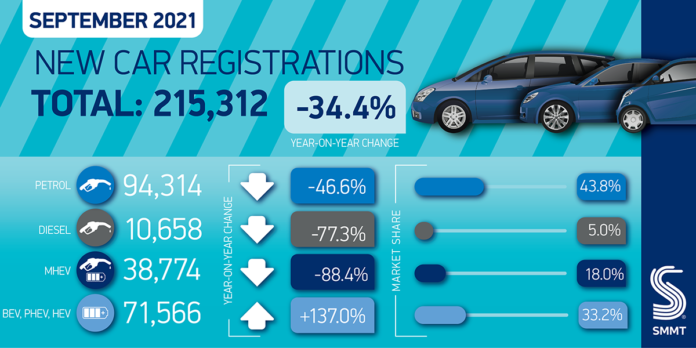New car registrations fell 34.4% on Covid-hit 2020 to 215,312 units, the weakest September since 1998, before the twice-a-year number plate system was introduced as Supply issues caused by semiconductor shortages continue to plague the industry
Battery electric vehicles saw their best monthly performance ever as 32,721 join the road.
September is typically the second busiest month of the year for the industry, but with the ongoing shortage of semiconductors impacting vehicle availability, the 2021 performance was down some -44.7% on the pre-pandemic ten-year average.
However, September was the best month ever for new battery electric vehicle (BEV) uptake. With a market share of 15.2%, 32,721 BEVs joined the road in the month, reflecting the wide range of models now available and growing consumer appetite.2 Indeed, the September performance was just over 5,000 shy of the total number registered during the whole of 2019.
Plug-in hybrid (PHEV) share also grew to 6.4%, meaning more than one in five new cars registered in September was zero-emission capable. Meanwhile, hybrid electric vehicles (HEVs) grew their overall market share from 8.0% in 2020 to 11.6%, with 24,961 registered in the month.
Mike Hawes, SMMT Chief Executive, said,
This is a desperately disappointing September and further evidence of the ongoing impact of the Covid pandemic on the sector. Despite strong demand for new vehicles over the summer, three successive months have been hit by stalled supply due to reduced semiconductor availability, especially from Asia. Nevertheless, manufacturers are taking every measure possible to maintain deliveries and customers can expect attractive offers on a range of new vehicles.
Despite these challenges, the rocketing uptake of plug-in vehicles, especially battery electric cars, demonstrates the increasing demand for these new technologies. However, to meet our collective decarbonisation ambitions, we need to ensure all drivers can make the switch – not just those with private driveways – requiring a massive investment in public recharging infrastructure. Chargepoint roll-out must keep pace with the acceleration in plug-in vehicle registrations.







